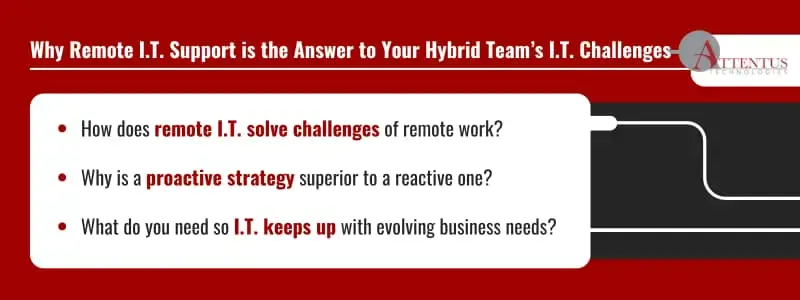With hybrid work becoming the new norm, remote I.T. can be the most cost-effective and scalable way to maintain efficiency. Let’s take a look at how it could help your operations.

Hybrid work is becoming the new norm, with 74% of U.S. companies shifting to flexible work models.
This change has many businesses wondering whether traditional in-house I.T. can rise to the occasion and support remote work. The answer is often not really, or at least not easily.
The traditional I.T. model is encumbered by many issues, including:
- Slow response times
- A lack of proactive support
- Poor flexibility
- Connection issues
- Downtime
- Cybersecurity threats
- Inefficient operations
In short, it fails to meet hybrid work arrangements’ needs.
In contrast, remote I.T. support offers a cost-effective, scalable way to maintain efficiency while ensuring employees—whether in the office or working remotely—get the seamless technical assistance they need.
Let’s explore the key benefits of remote I.T. support, including cost savings, enhanced security, and strategic guidance that goes beyond just fixing technical issues.
Cost Savings Without Compromising Quality
Two big issues with in-house I.T. teams are that they can be expensive and don’t offer around-the-clock coverage. They require salaries, benefits, and training, making them a costly investment. Many small to mid-sized businesses can’t justify the price tag of a dedicated I.T. team for hybrid work environments.
This is where remote I.T. support shines, offering predictable, lower-cost solutions.
Business owners can better control their budgets and eliminate surprise costs with reasonable flat-rate pricing. That’s because hybrid work I.T. support means fewer on-site visits, so overhead costs are reduced. And the flexibility of remote troubleshooting enables companies to easily scale their support needs without hiring additional (or letting go of) staff.
Companies also improve their satisfaction and improve employee retention scores by catering to remote staff’s needs.
Enhanced Security and Compliance for Hybrid Workforces
One of the outstanding issues with remote and hybrid employees is the marked increase in security risks.
Here are a few of the most common issues:
- Staff working from home often use unsecured networks, making them vulnerable to cyberthreats.
- Weak or shared passwords, lax security precautions, insufficient data encryption, and improperly secured mobile devices connecting with the work network can all lead to security problems and potential data breaches.
- Many companies lack the expertise to implement enterprise-grade security on remote devices.
- Businesses might also struggle with compliance issues for data security—such as the Federal Trade Commission (FTC) Safeguard Rules and Health Insurance Portability and Accountability Act (HIPAA)—when systems are accessed from various locations. HIPAA limits the use of protected health information (PHI) by healthcare organizations, for example. Groups that are not compliant with such regulations can face severe fines and penalties, as well as damage to their reputations and loss of customer trust.
But remote I.T. support can mitigate risks by offering remote monitoring and 24/7 protection against cyberthreats. Cloud-based security solutions keep company data secure and keep businesses aligned with regulations, no matter where their staff is located.
The right information can help remote and in-house staff do their part to avoid security breaches. Implementing educational awareness sessions such as webinars or in-house training also helps reduce human error.
Faster Troubleshooting and Reduced Downtime
The traditional I.T. model typically provides inconsistent support for in-house employees, and even more inconsistent service for remote workers. This downtime and disruptions to service can lead to employee frustration and lost productivity.
Real-time remote access I.T. solves a lot of these issues. It:
- Allows technicians to fix issues within minutes, not hours, increasing workers’ productivity and peace of mind.
- On-site staff and remote workers all receive the same level of fast, superior support service.
- Hybrid work remote support can also be part of an I.T. process automation solution, offering proactive monitoring, automated alerts, and self-healing systems.
- An AI-driven approach can prevent issues before they escalate, saving time and money while improving the accuracy of tasks handled.
Other benefits of remote troubleshooting include:
- Better access to experts
- Improved customer service
- More reliable I.T. systems
- Faster resolution of issues
- Improved productivity
- Enhanced collaboration
- Lowered commuting costs
Beyond the Help Desk: Strategic I.T. Guidance for Business Growth
Many traditional I.T. services focus on fixing problems, not on helping businesses grow through technology. Such reactive support simply isn’t good enough in today’s fast-evolving technological workplace.
Business leaders require a managed service provider (MSP) that aligns I.T. strategy with long-term goals for a proactive approach.
That’s where Attentus Technologies comes in. We provide true I.T. leadership through our standout vCIO (Virtual Chief Information Officer) services—covering everything from strategic planning for cloud migrations and security improvements to long-term operational efficiency.
Our remote I.T. support services ensure that your essential systems and applications are always up and running and that any problems are resolved quickly and accurately by knowledgeable professionals. We believe in delivering exceptional results, always working to understand issues from our clients’ point of view.
With a 10-year average client retention rate and a 98.4% customer satisfaction score, our clients stay with us because we consistently deliver measurable value and peace of mind.
Schedule a free I.T. consultation today to see how remote I.T. support can optimize your business.
